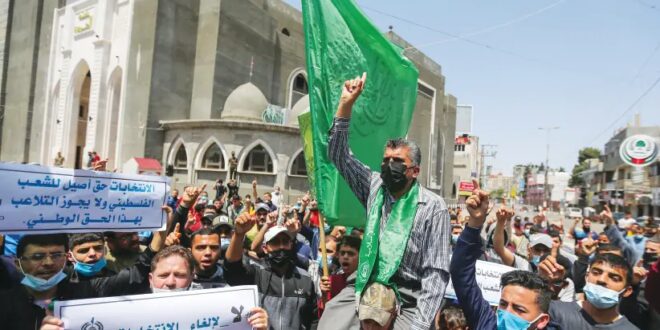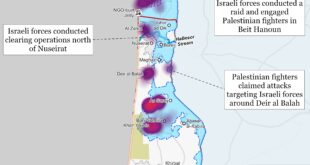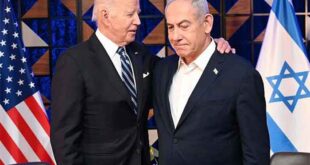Like many Palestinians, Nadia Harhash was not surprised by Palestinian Authority President Mahmoud Abbas’s decision last week to delay the Palestinian elections.
Harhash, a prominent Palestinian journalist, author and political analyst from east Jerusalem, was on the Together We Can list for the parliamentary election, which was supposed to take place on May 22. The electoral list is affiliated with former PA prime minister Salam Fayyad.
Although she was unhappy with Abbas’s decision, Harhash, in retrospect, believes that it was a “wise” move on the part of the PA president.
“I believe the decision to postpone the elections was expected,” the mother of four told The Jerusalem Post. “Using Jerusalem as an excuse was also expected, though it was not a smart move. The decision, however, turned out to be a wise move.”
Harhash was referring to the dispute surrounding the participation of Jerusalem Arabs in the Palestinian elections.
Announcing the delay, Abbas told leaders of various Palestinian factions that Israel had failed to respond to the PA’s request to hold the elections in Jerusalem.
In reality, however, Israel never said that it would prevent the Palestinians from holding elections in Jerusalem. Israel, in addition, never said that it would ban Jerusalem Arabs who hold Israeli-issued ID cards from presenting their candidacy or casting ballots in the Palestinian elections.
Only 6,300 Arab residents of Jerusalem were expected to vote at five Israeli post offices. The rest of the eligible voters – estimated at 150,000 – were free to cast ballots at voting centers stationed in PA-controlled areas surrounding Jerusalem. These voters did not need Israel’s permission to travel a few kilometers away from the city to vote in the Palestinian elections.
The vast majority of Jerusalem Arabs, in other words, could have participated in the elections without Israel’s approval. There was no way that Israel could have stopped voters from traveling, or even walking, to nearby PA-controlled villages and towns (located outside the boundaries of the Jerusalem Municipality) to cast ballots or launch electoral campaigns.
It is worth noting that only a small number of Jerusalem Arabs participated in previous elections for the PA presidency and parliament in 1996, 2005 and 2006. That’s because most residents of east Jerusalem did not seem to be interested in the PA elections. These residents were well aware of the fact that the PA has no jurisdiction over Arab neighborhoods that are under Israeli sovereignty in Jerusalem.
Since Abbas’s January 15 decree to hold the general elections, only a few hundred residents of east Jerusalem, most of whom are political activists, showed interest in the vote. Therefore, it was safe to assume that the majority of the Jerusalem Arabs anyway had no intention to be involved with the Palestinian elections. Their participation or nonparticipation in the elections would not have made a big difference.
Abbas’s critics argue that if he really cared about the issue of Jerusalem, he should have sought guarantees from the European Union and other international parties before, and not after, his decision to announce the elections.
“President Abbas began talking about the issue of Jerusalem only after he announced the elections,” noted Palestinian political analyst Ayman Barakat. “If he wasn’t sure that Israel would allow the elections to take place in Jerusalem, why did he issue the decree [to hold the elections]? Why didn’t he tell the Europeans who were pressing him to hold elections that he will comply only after the Palestinians receive assurances from Israel that Jerusalem will be included? That was the mistake he made.”
Some Palestinians say that Abbas was never serious in the first place about holding the elections and that’s why he didn’t bother back then to demand guarantees regarding the inclusion of Jerusalem. They claim that when Abbas announced the elections, he did so only to appease European donors and impress the new Biden administration.
Other Palestinians are convinced that Abbas worked in collusion with Israel to find a way to call off the elections.
According to these Palestinians, Abbas and Israel came to the conclusion that maintaining the status quo was better than risking holding elections that could see Hamas or other Palestinian extremists scoring a victory, especially in the vote for the parliament, the Palestinian Legislative Council.
Abbas and his ruling Fatah faction have yet to overcome the trauma of their loss to Hamas in the 2006 parliamentary election. Abbas and several Fatah leaders still find it hard to forgive Hamas for the bloody coup it waged against them in the Gaza Strip in 2007. Abbas, in addition, will never forgive Hamas for its alleged attempt to kill him during one of his visits to the Gaza Strip.
What worried Abbas in the past few weeks was the fact that Hamas was running in the parliamentary election as a unified list, while Fatah was running on three separate slates.
THE FIRST blow to Abbas came when veteran Fatah official Nasser al-Kidwa, a nephew of former PLO leader Yasser Arafat, announced his decision to contest the parliamentary vote. A furious Abbas immediately retaliated by expelling Kidwa from the Fatah Central Committee, the faction’s highest decision-making body.
A few weeks later, Abbas was dealt an even bigger blow when jailed Fatah leader Marwan Barghouti, who is serving five life sentences for his role in terrorist attacks against Israelis during the Second Intifada, joined forces with Kidwa.
Barghouti’s decision to join forces with Kidwa was seen by Abbas and other Palestinians as an extremely serious challenge to the PA president, particularly in light of talk that the imprisoned Fatah leader was planning to present his candidacy in the presidential elections, which were scheduled to take place on July 31.
It was easy for Abbas to expel Kidwa from Fatah and present him as someone who had violated the faction’s internal regulations by forming his own list for the parliamentary elections.
Unlike Barghouti, Kidwa, a former PA foreign minister and envoy to the United Nations, does not have grassroots support among Palestinians. Barghouti, on the other hand, is regarded by some Palestinians as a popular and respected leader. That’s undoubtedly the reason Abbas did not take any measures against Barghouti after the latter’s decision to run outside Fatah’s official slate for the parliamentary election.
A Fatah official told the Post that Abbas wanted to expel Barghouti from Fatah, but was persuaded by his senior advisers not to take such a drastic measure.
“It would have caused huge damage to Abbas and Fatah,” said the official, referring to the since-shelved intention to expel Barghouti.
According to the official, it was Barghouti’s move that made Abbas realize that the idea to hold long-overdue elections was not a good one after all.
The Barghouti-Kidwa alliance was not the only challenge facing Abbas and Fatah.
Abbas and veteran Fatah leaders in the West Bank were following with deep concern the activities of Mohammad Dahlan, the exiled Fatah leader who moved to the United Arab Emirates after a fallout with the PA president in 2011.
Dahlan loyalists, especially in the Hamas-ruled Gaza Strip and east Jerusalem, were well organized and appeared to have unlimited financial resources.
“The money was coming from the United Arab Emirates,” said a Palestinian journalist from east Jerusalem. “Dahlan’s supporters were planning to invest millions of dollars in their electoral campaign. They were also paying large sums to young Fatah activists who were unhappy with Abbas and the current Fatah leadership.”
At one point, Abbas was said to have told Fatah leaders in early April that he believed that Israel, the United Arab Emirates and other “international and regional parties” were promoting Dahlan and his men as part of a scheme to remove him (Abbas) from power.
Abbas also reportedly expressed concern about the rapprochement between Dahlan and Hamas. In the past four months, Hamas has allowed scores of Dahlan loyalists to return to the Gaza Strip in preparation for the elections. The Dahlan supporters, mostly Fatah and former PA security officers, had fled the coastal enclave before and during the 2007 Hamas coup.
Like his predecessor (Arafat), the 85-year-old Abbas is known as big believer in conspiracy theories. When he announced the postponement of the elections, Abbas hinted that Dahlan supporters were the only ones permitted to hold election gatherings in Jerusalem.
The Jerusalem Police had briefly detained a number of Abbas loyalists and Fatah candidates for holding meetings in the city in violation of a law that bans the PA from carrying out political or other activities in Jerusalem. Abbas, in other words, was saying that Israel, together with the United Arab Emirates, was supporting his sworn enemy, Dahlan, ahead of the elections.
“Somehow, Abbas realized that he was about to fall into his own trap,” remarked Harhash, the east Jerusalem candidate. “The sharp dispute in Fatah made Jerusalem a viable reason for postponing the elections. I think the issue is beyond Palestinian internal disputes; it is more of a perceived coup led by disgruntled Fatah leaders and Hamas. In the eyes of Abbas, this coup was backed by the United Arab Emirates, Qatar, Egypt and, of course, Israel.”
IN THE end, it was Israel that helped Abbas climb down the high ladder of the elections. By failing to respond to the Palestinians’ request to hold the elections in Jerusalem, Israel provided Abbas with a good pretext to delay the vote.
Paradoxically, Abbas would have been in bigger trouble had Israel announced its agreement to hold the elections in Jerusalem. Such a move would have intensified the Fatah infighting and facilitated the rise of Hamas and other anti-Abbas parties and figures to power.
But the postponement decision did not come without a price. Abbas is currently facing widespread criticism from Palestinians from across the political spectrum, as well as the European Union and United Nations, for using the Jerusalem dispute as an excuse to call off the elections.
Although his credibility has been severely undermined, the decision to delay the elections does not pose an imminent threat to Abbas’s rule.
But, as many Palestinian political analysts pointed out this week, the decision constitutes the beginning of the countdown to the end of the Abbas era.
Most of the electoral lists that had registered for the parliamentary elections have formed an alliance with the goal of waging a massive campaign against what they perceive to be Abbas’s autocratic rule over the PA and his refusal to pave the way for the emergence of new leaders.
Abbas’s critics and political rivals are saying that this time they will not allow him to get away with his decision to deprive the Palestinians of their right to elect new leaders and have a say in the decision-making process.
 Eurasia Press & News
Eurasia Press & News




